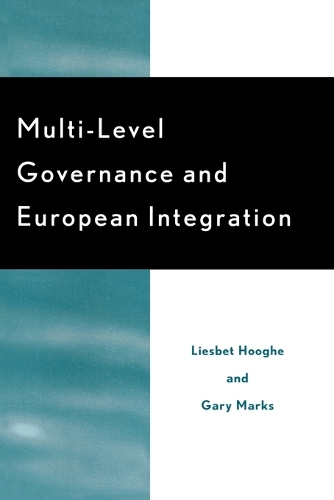
Multi-Level Governance and European Integration
(Paperback)
Publishing Details
Multi-Level Governance and European Integration
By (Author) Liesbet Hooghe
By (author) Gary Marks
Bloomsbury Publishing PLC
Rowman & Littlefield Publishers
21st March 2001
United States
Classifications
General
Non Fiction
International institutions / intergovernmental organizations
341.2422
Physical Properties
Paperback
272
Width 153mm, Height 229mm, Spine 15mm
372g
Description
European politics has been reshaped in recent decades by a dual process of centralization and decentralization. At the same time that authority in many policy areas has shifted to the supranational level of the European Union, so national governments have given subnational regions within countries more say over the lives of their citizens. At the forefront of scholars who characterize this dual process as "multi-level governance", Liesbet Hooghe and Gary Marks argue that its emergence in the second half of the 20th century is a watershed in the political development of Europe. Hooghe and Marks explain why multi-level governance has taken place and how it shapes conflict in national and European political arenas. The book contains original research and is written in a clear and accessible style.
Reviews
"Hooghe and Marks have ingeniously expanded multilevel governance as a frame for understanding the dynamic politics of the European Union. This volume, building on their previous work, brings together an assessment of the changing spatial politics of the EU with the analysis of competing forms of capitalism. In so doing they provoke us to rethink the roles of political institutions in western Europe." - Helen Wallace, University of Sussex's European Institute "This is the book for which many have waited. Over the last decade, the authors, singly and jointly, have published a series of fascinating articles that challenged the conventional dichotomy of "intergovernmental" and "supranational" interpretations of European Union politics. The present volume synthesizes and extends these analyses, demonstrating not only the superior plausibility and internal consistency of the multi-level perspective, but also the wide range of research questions to which it can be usefully applied. Among the highlights are not only definitive accounts of the rise and decline of multi-level cohesion policies, but also sophisticated analyses of multiple identifications at the level of constituencies and of divergent orientations toward European integration among Commission officials and among national political parties. Altogether, this volume combines a wealth of empirical information with incisive analyses that are integrated in a convincing theoretical framework. A must for every student of European Union politics." - Fritz Scharpf, Max Planck Institute
Author Bio
Liesbet Hooghe is associate professor of political science at the University of North Carolina at Chapel Hill. Gary Marks is professor of political science at the University of North Carolina at Chapel Hill and director of the UNC Center for European Studies.
